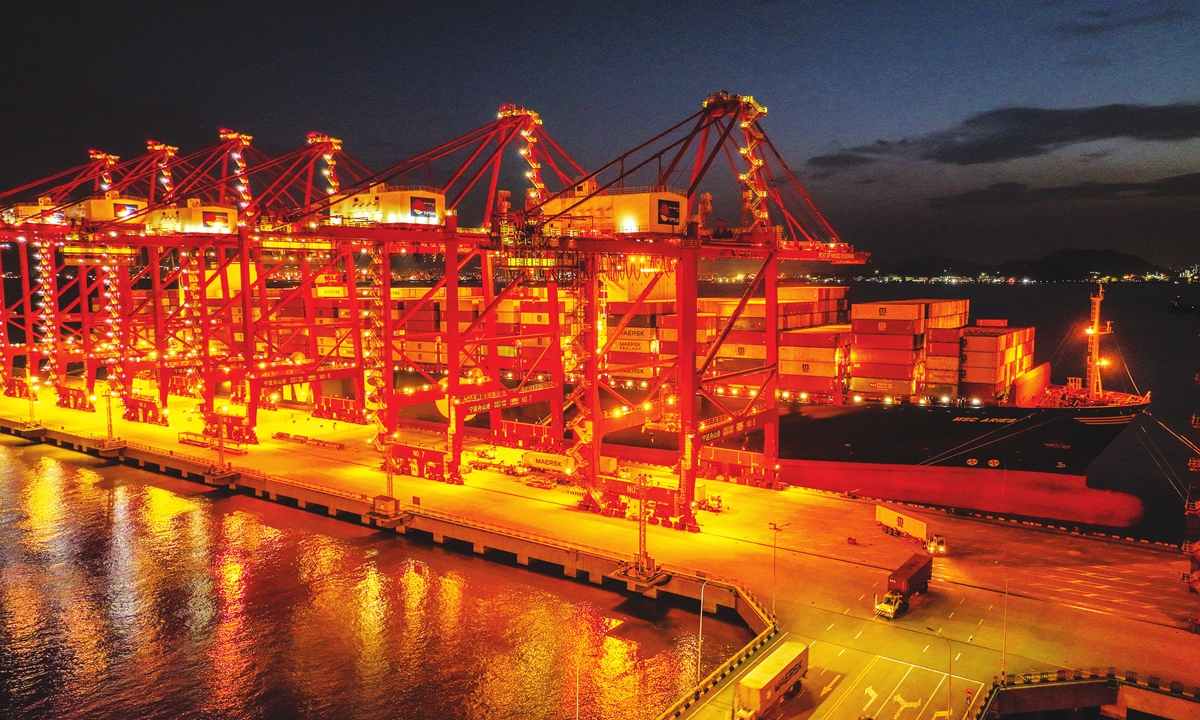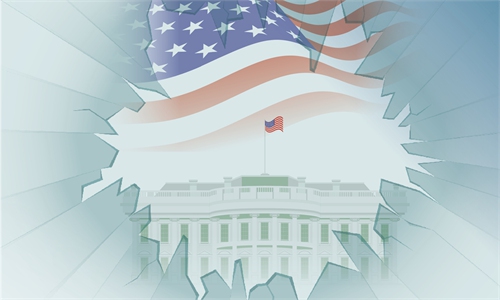US cannot force politics on technology to coerce decoupling: Chinese scholar

Ningbo-Zhoushan port. Photo: VCG
Editor's Note:The Biden administration has ratcheted up decoupling with China despite the fact that the move goes against market principles and causes losses for the US itself. Can the US achieve this goal? Can economies such as India and Southeast Asia replace the Chinese market? Global Times (GT) reporter Wang Wenwen talked to Zheng Yongnian (Zheng), professor at the Chinese University of Hong Kong, Shenzhen, and president of the Institute for International Affairs, Qianhai, over these issues.
GT: You have said in previous interviews that the US and China will not completely decouple. There are two reasons. First, as long as the US is still capitalist and capital always goes where the money will be made, the US will not close itself off. Second, as long as China is open, and there is no reason for China to be closed. Can a politically polarized US maintain basic policy rationality?
Zheng: We need to view the US from a diverse perspective so as to have a realistic assessment of it. If we see the US just as monolithic, we may have misunderstandings.
Like many other countries, the US is a country consisted of vested and diverse interests. The United States of America is actually the United States of Different Interests. Those who want to decouple with China consist of some in the US administration and those pro-Cold War and anti-communism.
The attitude of Wall Street toward China differs from that of the military industrial complex; the attitude of the federal government differs from that of the state governments; the attitude of eastern and western states differ from each other and the attitude of agricultural and industrial states differ from each other. In the US, there are forces that want to decouple with China, while there are forces that want to couple with China.
In the world's systems of economy and the supply chain, China's role is irreplaceable. China is the world's second biggest economy, and is not an isolated one. Both Trump and Biden have realized that China-US relations are not as simple as Soviet-US relations back in the Cold War era.
Even those who advocate decoupling with China worry that if the US does decouple with China, they will not get the information about China's development. Earlier this month, the US Commerce Department's Bureau of Industry and Security relaxed restrictions that barred export of some encryption technologies to Huawei.
Currently, China is impacted by US' policy of technology blockade. China develops so fast that the US sets up obstacles to prevent China from developing. But that does not mean China cannot make it.
China has no intentions to hurt the US or the West. It exports to the world made-in-China goods which are cheap and of a good quality. China has cheap labor and land. It has made sacrifices in its environment. China does not export democracy like the US. Nor does it export Communism like the Soviet Union did. China exports goods necessary to people's lives.
China has a 400 million middle-class population, and that population is still increasing. From the perspective of the nature of capital, there is no motivation to leave China. Why did China take up the global supply chain in just a few decades? The entry of foreign capital and the advantages of the Chinese market are crucial factors, but the most important one is political and social stability in China. China is one of the few economies, if not the sole, to achieve sustainable economic development and social stability at the same time. As long as China keeps opening, more foreign capital will come in.

Zheng Yongnian Photo: Courtesy of Zheng
GT: The facts show that the decoupling of China and the US will cause great losses to the US. However, the US continues to make extreme efforts to decouple in some areas. Recently, the US started to promote chip decoupling. Will the US continue this "partial decoupling" in important areas, or will it stubbornly choose to achieve complete "decoupling" with China step by step?Zheng: Some Americans want to achieve a full decoupling because they want to turn the China-US relationship into a relationship like the one between the US and the Soviet Union during the Cold War era. This is a dynamic process since whether China and the US can decouple is not determined by the US.
For instance, the US is afraid that Huawei will take a completely independent and different path, so it relaxed restrictions on Huawei. The same is happening in other fields in China. In any field, such as nuclear weapons, aerospace, and so forth, if China develops, other countries will come to participate, but if we don't develop them, we will be suppressed forever. It all depends on the capability and progress of China's technological innovation.
This involves the power of capital, not just political resistance. Taking chips as an example. Without political manipulation, it is balanced and in line with market supply and demand. If China's chip market is gone, even the US and its partners - Japan, South Korea, and even Taiwan island - will suffer. When China develops to a certain stage, the situation may even be reversed. The logic of technology is different from the logic of politics. We are now only talking about the logic of politics, but we cannot ignore the logic of technology.
GT: Many experts believe that the US Chip 4 Alliance will disrupt the global industrial and supply chains and will sacrifice the interests of US allies. What do you think of the future of the chip alliance promoted by Washington?
Zheng: There are so many alliances promoted by Washington, such as the Chip 4 Alliance and the alliance of the so-called democracies. The US is eager to form alliances in any field. The West always does that. An alliance is supposed to be a public good. The big countries must provide public good, whilst small countries must pay "protection fee."
Whether the alliance can be maintained depends on whether the US still has enough capacity to provide its public good. Why did the US withdraw from many alliances during the Trump administration? Trump actually felt that the US is not capable of protecting its allies unless they pay a protection fee. But there is a condition for a protection fee, that is, to have an enemy. If there is no enemy, these allies do not want to pay a protection fee. The US imagines China as a hypothetical enemy. But China does not pose a direct threat to those countries or economies, and over time, they are not willing to provide protection fees.
GT: For the purposes of suppressing China, the US-led West is trying to reconstruct supply chains, reduce China's position in the global supply chain system, and shape India and Southeast Asia into new supply chain centers. Do you think India and Southeast Asia have the potential to replace the Chinese market?
Zheng: A supply chain is a product of a combination of many factors, including land, labor costs, education, infrastructure, and more. Take India. The demographic dividend is no problem, but as the land is privately owned in India, infrastructure construction is very slow. In addition, the national mobilization capacity is not as efficient as China's, and its education is also a problem. Though China's land and labor costs are rising, the advantages in education are still here, not to mention the industrial chain has been formed, which makes it difficult to transfer out. Most importantly, the Chinese market is profitable. With all these factors combined, it is difficult to find an alternative market to China.
We should note that China must also have a sense of risk. When markets such as Vietnam, Indonesia, and Malaysia are making progress, China must strengthen its competitiveness and cannot take it for granted. Competitiveness can only be maintained through human effort. Thus, we must continue to reform and open up.
GT: What do you think of the recent arguments by some German politicians to "decouple from China" and change their policy line toward China? In the long run, in what direction will the economic and trade relations between Europe and China develop?
Zheng: What politicians in the West say is for votes or approval ratings, and they say one thing and do another. After the Russia-Ukraine conflict, Europe is sanctioning Russia on the one hand, and purchasing Russian energy on the other. If you ask German entrepreneurs what they think of China, their answers will be completely different from those of politicians. German entrepreneurs will not seek decoupling from China unless Germany returns to East Germany planned economy.
From the perspective of risk diversification, it is understandable that some multinational companies reduce their dependence on China. The same is true for China. This corporate level adjustment should not be interpreted with too much nationalist sentiment.
As a matter of fact, there is no geopolitical rivalry between China and Europe. The economic and trade relationship between Europe and China is still very optimistic. We do not deny that Europeans have idealism, but feasible idealism is the real ideal, and what is not feasible can only be utopia. Just look at how many German cars China consumes a year.




